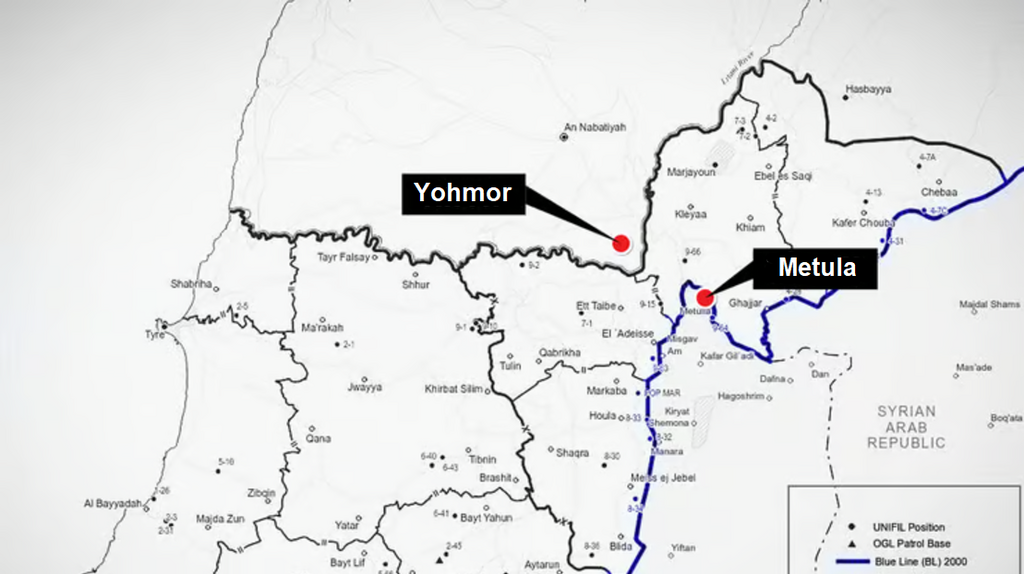Getting your Trinity Audio player ready...
The world continues to examine the details of the cease-fire agreement between Israel and Lebanon, highlighting the growing distinctions between it and UN Security Council Resolution 1701, which ended the 2006 Lebanon war between Israel and Hezbollah.
The deal, published by Lebanon's cabinet on Wednesday, runs to just over five pages of printed text and includes a map of southern Lebanon.
7th Armored Brigade in action ins southern Lebanon prior to cease-fire
(Video: IDF)
The area to be free of Hezbollah weaponry is delineated by a red line labeled "New 2024 line" that runs east-west across Lebanon.
It starts from a point on the coast about 25 km (15 miles) north of the Israeli border and runs eastward, mostly along the Litani River but then diverging from it north of the town of Yohmor, thus going beyond the area that UN Security Council Resolution 1701 said would be free of non-state arms.
The area in question is relatively close to Metula, meaning the new zone is intended to push Hezbollah operatives even further from the border—assuming the agreement is fully honored, which remains uncertain.
The expanded zone includes Beaufort Castle, a Crusader-era fortress considered strategic because it commands a view onto the Israeli border, said retired army brigadier general Hassan Jouni.
The 2006 resolution also said there would be "no weapons without the consent of the Government of Lebanon" deployed across Lebanese territory.
The new cease-fire deal goes further, stipulating that only "official military and security forces" in Lebanon are authorized to carry arms.
It specifically names those forces as the Lebanese Armed Forces, the Internal Security Forces, General Security, State Security, Lebanese customs and municipal police.
"Naturally it means a seriousness with implementation, so that there is no obscurity around this that could be interpreted in a different way," said Jouni.
"It serves the interest of the Lebanese state and its official institutions, but it is not to the interest of Hezbollah."
Officials in both the Beirut government and Iran-backed Hezbollah, which wields enormous political influence in Lebanon, have long referred to cabinet statements since 2008 enshrining the right to "resistance" as de facto official approval for Hezbollah's arsenal.
Two Lebanese officials told Reuters they did not find the added language in the new deal cause for concern, and said the most important achievement was a halt to the war.
But diplomats said the wording could give Israel more leverage than after 2006 to prevent Hezbollah from re-arming or redeploying fighters or weapons.
"Lebanon either didn't have any other option, or they think they can outsmart it," one diplomat from the region said.
A senior Western diplomat said Israel had such an upper hand, following months of heavy strikes that eliminated much of Hezbollah's top leadership and displaced more than 1.2 million people, that it could effectively dictate terms.
Hezbollah lawmaker Hassan Fadlallah was asked by a reporter on Wednesday about Prime Minister Benjamin Netanyahu's statements that Israel retained military freedom of action and would strike Hezbollah if it violated the deal.
Fadlallah said the group would retain the right to defend itself if Israel attacked.
U.S. President Joe Biden’s special envoy, Amos Hochstein, discussed the cease-fire agreement in an interview with NBC, highlighting the challenges in achieving it. Hochstein noted that Israel reached a point of significant military achievements and was advised to leverage them for political gains, emphasizing that lasting security can only be achieved through an agreement with Lebanon, not by imposing security measures.
He added that Lebanon also faced a pivotal moment where difficult political decisions were necessary to demonstrate control over the country and concern for its citizens.
'We must be ready for renewed skirmishes or full-scale fighting'
Overnight, the IDF struck three key border crossings between Syria and Lebanon, following a wave of 330 strikes in the 24 hours leading up to the cease-fire. The military emphasized its commitment to enforcing the agreement, which mandates the withdrawal of forces from Lebanon within 60 days while preventing Hezbollah's presence south of the Litani River and halting the transfer of weapons across Lebanon.
Get the Ynetnews app on your smartphone: Google Play: https://bit.ly/4eJ37pE | Apple App Store: https://bit.ly/3ZL7iNv
“There is an international mechanism led by the U.S., with representatives in Beirut, Northern Command and Tel Aviv, but we are not relying on it,” the IDF said. “We must enforce the agreement ourselves and be ready for the possibility of renewed skirmishes or full-scale fighting. The achievements in Lebanon must be leveraged, and we remain focused. Implementation of the understandings will unfold gradually in the coming weeks.”
The military warned of the need for public readiness to support enforcement strikes should violations occur. “Israeli readiness to act is key. We may return to fighting—we are only on the first day of this arrangement. In some areas, there are mobile operations; in others, static deployments. Lebanese civilians will not return to border villages anytime soon. Tactical movements will occur, but forces are not leaving the area yet.”
Regarding clashes with Lebanese residents, the IDF said: “The incidents involve Lebanese individuals, including terrorists emerging from hiding and attempting to flee. Some were shot and detained, while others were killed or injured.”







